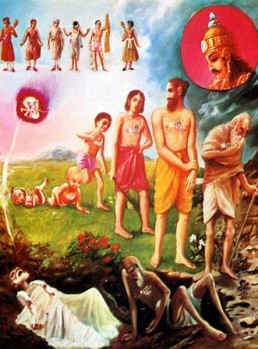Swami Chinmayananda
Swami Chinmayananda Commentary
Here is an explanation why quietude of the mind is so often and so insistently emphasised in the literature explaining the Hindu-technique of Self-perfection. Unless the mind be quiet, the individual will not have the intellectual leisure for cultural self-development, nor the inner energy for consistently living spiritual perfections, that a truly developed man yearns for. Unless there is tranquillity, there cannot be steadiness of intellectual application to the problems of life, and without this self-evaluation of life and true observation with a clear discriminative analysis, we cannot have in us the required amount of “Devotion to Self-knowledge” (Bhavana). Without such a glorious Goal before us, constantly beckoning us unto itself, like a pole star, our life shall be a lost ship in an ocean, going nowhere, reaching nowhere, and ultimately foundering upon some treacherous rock.
One who has no philosophical goal in life to strive and yearn for, will not know what peace of mind is, and to one who is thus restless, “where is happiness?” To live in balance, and sail safely upon the uncertain waves of the ocean of life, through both its smiling weather and stormy days, we must have a constant perception of the Real. Without a drummer, the dancers’ foot-work cannot be rhythmic and cannot keep perfect time.
WHY IS THERE NO KNOWLEDGE FOR THE UNSTEADY? LISTEN:
Adi Sankara Commentary
Ayuktasya, for the unsteady, for one who does not have a concentrated mind; na asti, there is no, i.e. there does not arise; buddhih, wisdom, with regard to the nature of the Self; ca, and; there is no bhavana, meditation, earnest longing [Longing to have a continuous remembrance of the knowledge of Brahman which arises in the mind from hearing the great Upanisadic sayings (maha-vakyas).] for the knowledge of the Self; ayuktasya, for an unsteady man. And similarly, abhavayatah, for an unmeditative man, who does not ardently desire the knowledge of the Self; there is no santih, peace, restraint of the senses. Kutah, how can there be; sukham, happiness; asantasya, for one without peace? That indeed is happiness which consists in the freedom of the senses from the thirst for enjoyment of objects; not the thirst for objects — that is misery to be sure. The implication is that, so long as thirst persists, there is no possibility of even an iota of happiness! It is being stated why a man without concentration does not possess wisdom:
The Bhagavad Gita with the commentary of Sri Sankaracharya – Translated by Alladi Mahadeva Sastry
Holy Geeta – Commentary by Swami Chinmayananda
The Bhagavad Gita by Eknath Easwaran – Best selling translation of the Bhagavad Gita
The Bhagavad Gita – Translation and Commentary by Swami Sivananda
Bhagavad Gita – Translation and Commentary by Bhaktivedanta Swami Prabupadha
Srimad Bhagavad Gita Chapter 2 – Verse 66 – 2.66 nasti buddhir – All Bhagavad Gita (Geeta) Verses in Sanskrit, English, Transliteration, Word Meaning, Translation, Audio, Shankara Bhashya, Adi Sankaracharya Commentary and Links to Videos by Swami Chinmayananda and others – 2-66

